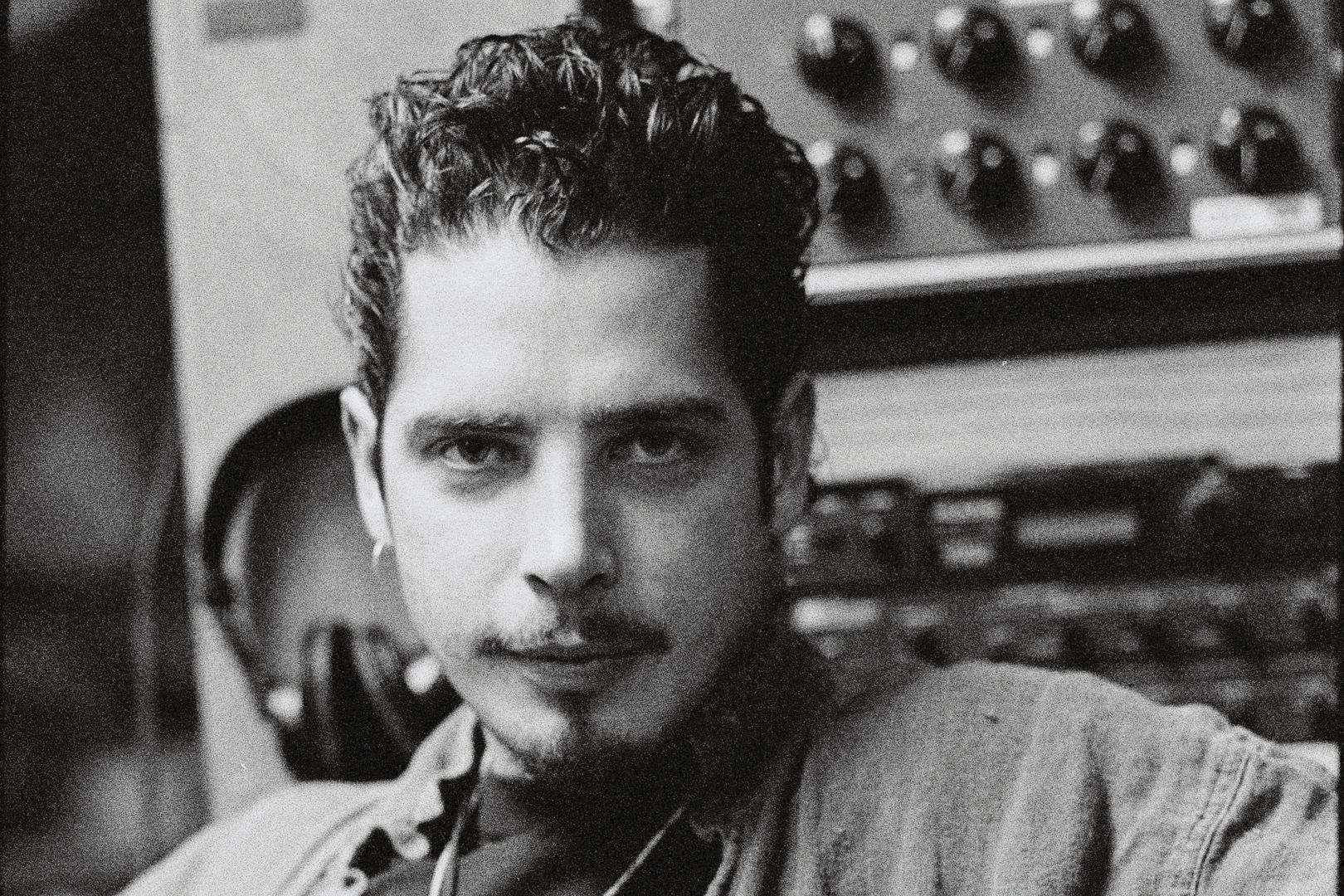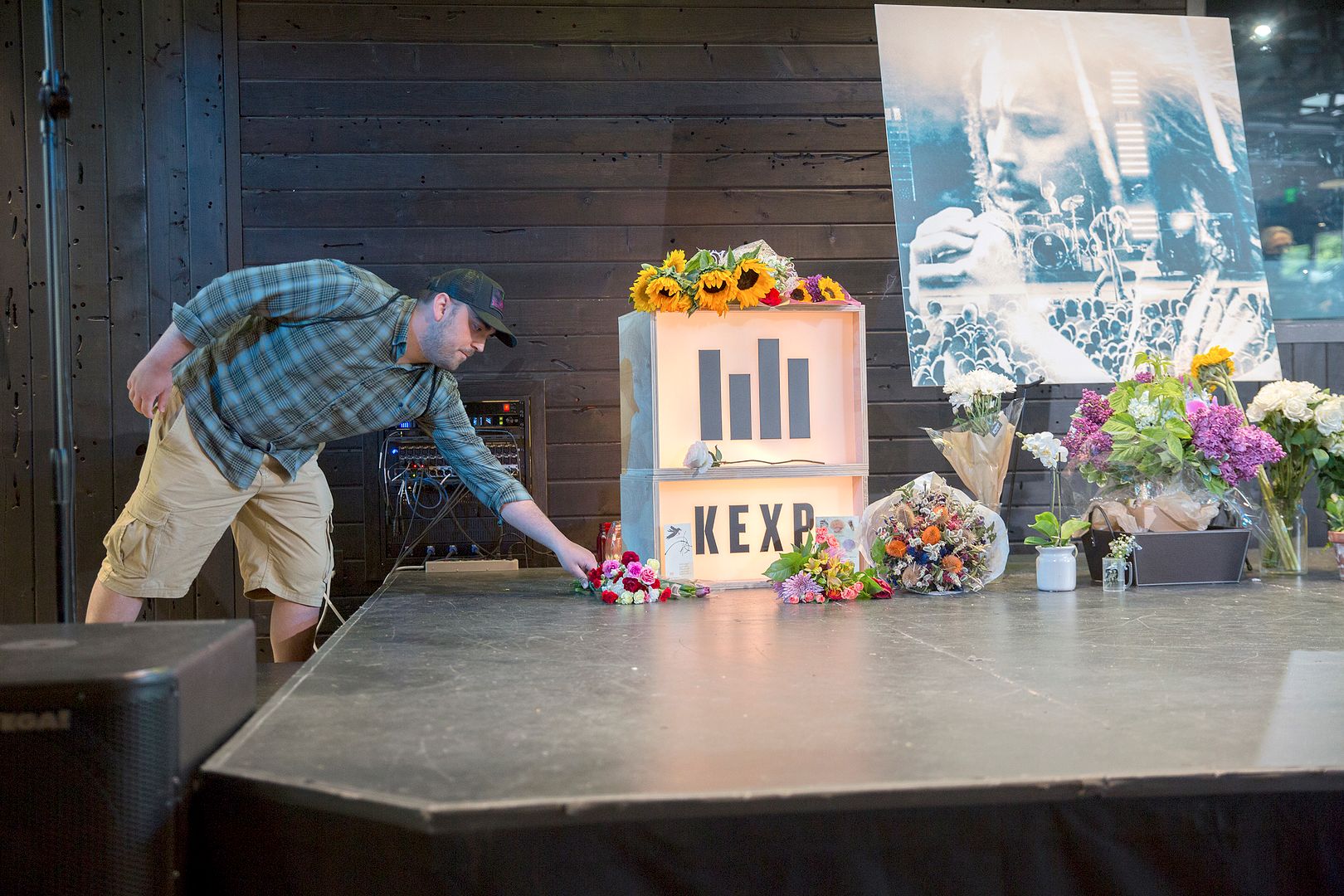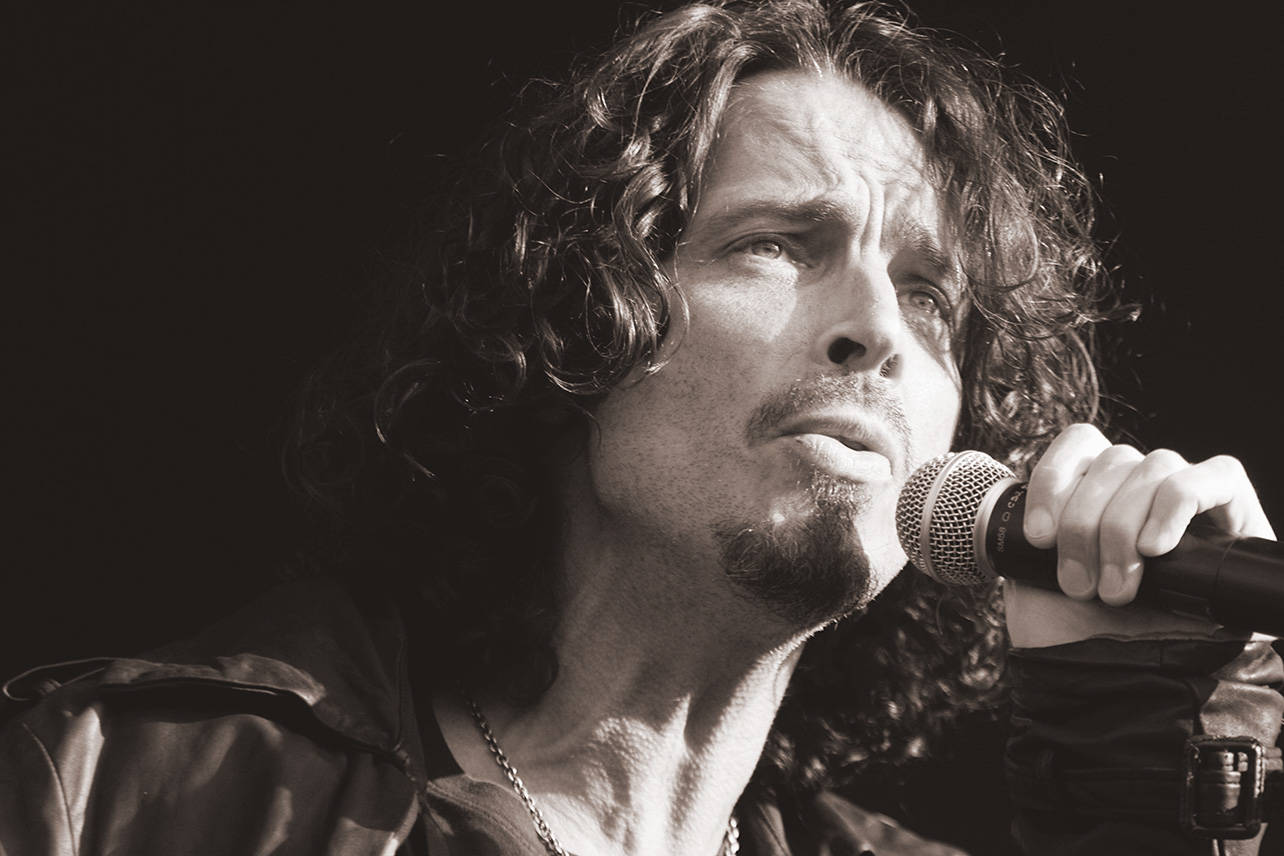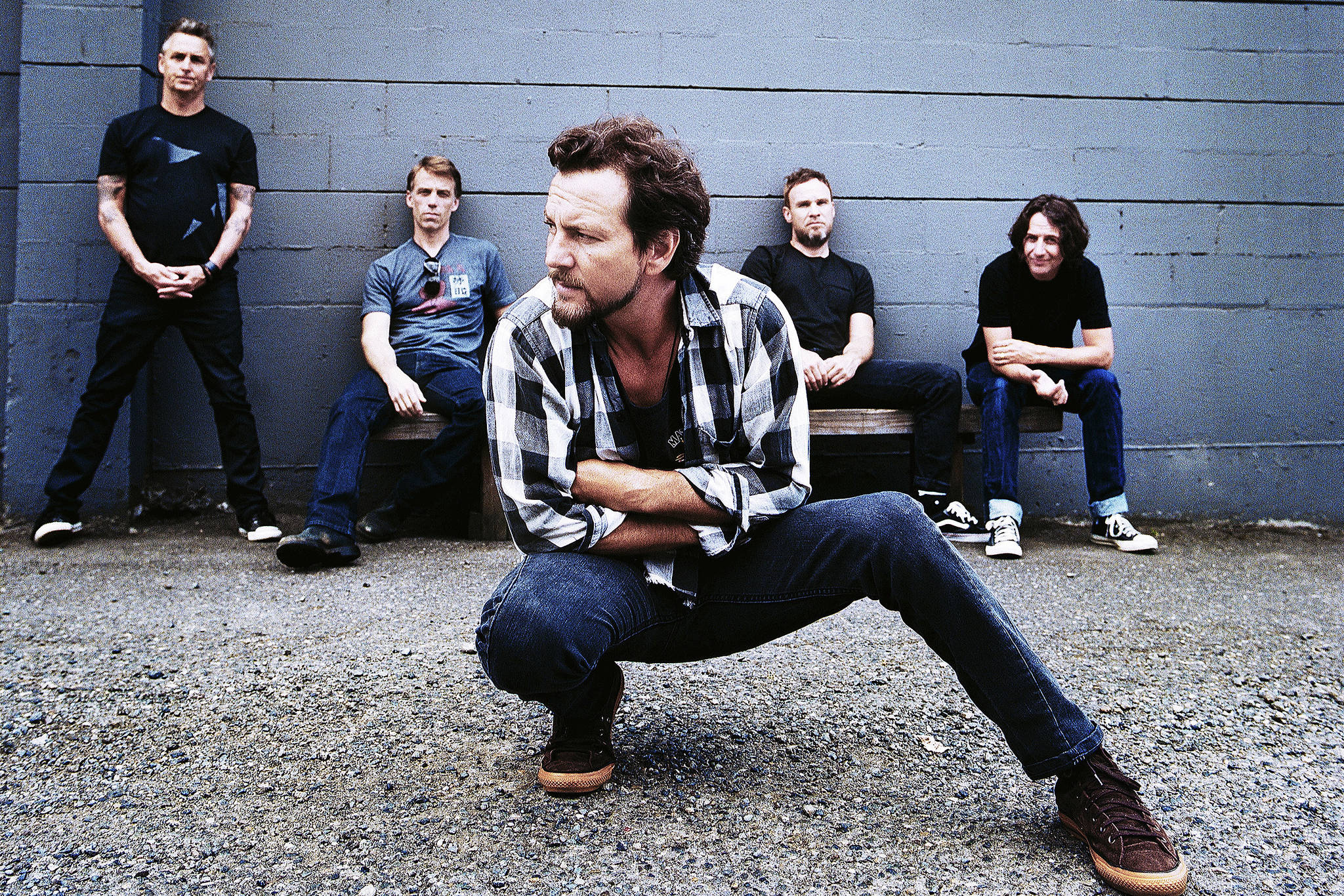When Chris Cornell entered a room, the air seemed to hum with his presence. All eyes darted to him, then danced over his mop of curls and lanky frame. He appeared to carry himself carelessly, but there was calculation in his approach—the high, loose black boots, tight jeans, and impeccable facial hair his standard uniform. He was a rock star. He knew it. He knew you knew it. And that didn’t make him any less likable. When he left the stage—and, in my case, his Four Seasons suite following a 2009 interview—that hum leisurely faded, like dazzling sunspots in the eyes.
That presence helped Cornell reach the pinnacle of popular music as front man for Soundgarden. It allowed him to tour the world with that band and as a solo artist. It factored into Grammy Award nominations and wins, songs for major Hollywood films. It made him a target of paparazzi. It helped make him famous.
But there was more to Cornell than his magnetism, his musical talent, and that unmatched, pliant voice his fans yearned for. He was a mentor and loyal friend. He elevated other artists just by being around, in the rehearsal space, in the apartment. For those he bonded with, the impact was much greater. He helped shape their personas and careers. And his relationships with two other band leaders—Malfunkshun and Mother Love Bone’s Andrew Wood and Pearl Jam’s Eddie Vedder—singlehandedly shaped the Seattle-centered global revolution that was grunge.
Cornell’s band was the first of the major “grunge” acts, and the others were inevitably influenced by the Soundgarden front man. His prowling, carnal stage presence inspired many, even while it irked others. His no-holds-barred vocals encouraged the raw usage of the human instrument that became a hallmark of the genre. His all-in showmanship demonstrated that stardom could be embraced without sacrificing one’s artistic integrity. And he provided an example of how to stretch beyond one’s perceived creative wheelhouse. Grotesquely, it’s easier to connect the dots now that Cornell is gone. The pioneering. The influences. The dark lyrics. The impact on our city—both its history and future. His death in the midnight hour of May 18—designated a suicide by authorities, a finding contested by his wife—left a black hole in fans’ and friends’ hearts and in Seattle’s music community. You don’t know what you’ve got ’til it’s gone, the song goes. I think we did know what we had in Cornell, but like all things, we took him for granted, wanted more Soundgarden, more Temple of the Dog, more shows, more of his octave-crushing howl—without considering the toll it all took on him.
Looking back at my hotel-room talk with Cornell, it’s also easier to see that he felt compelled to create just as fervently as people wished he would. Through half of our conversation, he was kicked-back, cool and indifferent. He ran fingers through his hair. He shrugged. He spoke in short bursts of flat syllables. Soundgarden was split at the time, and he showed no interest in getting the band back together. He showed little interest in many of my questions. Until I noted he had a pattern of daring creative expression outside of Soundgarden: Audioslave’s softer side; bluesy solo efforts; the guitar-eschewing Scream with beatmaker Timbaland.
At this, Cornell’s eyes sharpened. He sprung forward and became fully engaged. He got up and brought me an unsolicited bottled water, then paced a bit, talking all the while. About needing to stay unpredictable. About always trying new things. He told me that he wrote many songs “in character,” outside of himself. He said, “I’m not trying to find my musical identity, because the moment I find it, I then become a painter or a novelist or something.” It was obvious that the man was fueled by music, that he was always seeking the next sound, not a singular Chris Cornell sound. He joked that Seattle’s weather helped with that pursuit, providing cold, dark places to write about cold, dark things. Hindsight, though, suggests that was fabricated levity.
Over the years Cornell battled addictions, but what he ultimately succumbed to was intangible and internal. His creative passions, I believe, punched holes in that cold interior darkness, offering hope even as it let more blackness flood in. As he sang in “Reach Down,” unquestionably assuming the character of his late friend Andrew Wood: “Love was my drug, but that’s not what I died of.” It’s an uncomfortably apt coda for Cornell’s own life.
Cornell’s love, we’re now given the unfortunate opportunity to understand, fostered much of the music and culture born here in the late ’80s and ’90s. Here are five distinct ways the mercurial artist changed Seattle’s music scene and identity—and therefore shaped the planet’s culture—through his ceaseless ambition, bravery, and friendship.
 A young Soundgarden. Photo by Mark Seliger
A young Soundgarden. Photo by Mark Seliger
His Band Started It All
Soundgarden formed in 1984, well before the city’s golden age of rock began, and before most other notable guitar-heavy acts were playing, with the noted exception of Green River (which would split into Mudhoney and two-fifths of Pearl Jam). In the band’s infancy, Cornell sang from behind the drum kit, flanked by bassist Hiro Yamamato and guitarist Kim Thayil. A year later, the vocalist deferred percussion duties, and the move changed the dynamic—and the trajectory—of the band. Ironically, Cornell decided to focus on vocals after watching Matt Cameron drum for the band Feedback. As he recalled thinking in Mark Yarm’s book Everybody Loves Our Town, “Oh, that’s what a good drummer is supposed to play like. Maybe my talent lies elsewhere.” His epiphany opened the door for Cameron to join the band in 1986—and proved to be quite an understatement.
In that year, Soundgarden’s first recordings were pressed into wax. The now-legendary Deep Six compilation featured the songs “Heretic,” “Tears to Forget,” and “All Your Lies.” Though even the record’s producers admit its sound quality and sales disappointed, the compilation proved to be the flare signaling Seattle’s rise. Soundgarden and the comp’s other five bands gained local notoriety simply by being recorded. It brought coverage in influential music paper The Rocket, and more live shows.
Soundgarden impressed most people who saw the band play, including Bruce Pavitt and Jonathan Poneman. The former had been issuing an underground fanzine and compilation cassettes in Olympia, then Seattle, since the early ’80s and struggled to release Green River’s Dry as a Bone EP on his fledgling Sub Pop label in 1987. The latter was a musician and KCMU (now KEXP) host with, as he said in Everybody Loves Our Town, “like $15,000” in savings bonds and a strong desire “to do a record with Soundgarden.”
Pavitt and Poneman joined forces, according to Poneman, to “make Sub Pop an ongoing concern.” Their first order of business: Soundgarden. They released the band’s first single, “Hunted Down,” backed with “Nothing to Say,” and then its Screaming Life EP. The releases kindled early success for both band and label. KCMU DJ Faith Henschel included “Nothing to Say” on an A&R-baiting cassette titled Bands That Will Make Money—and her assertion would prove true with Cornell’s band. Interest from multiple majors followed shortly after. And Sub Pop, owing its formation to Soundgarden, would soon start making its own money.
Early Soundgarden drew comparisons to Led Zeppelin and Black Sabbath. The band’s chemistry was palpable to all who witnessed it. Their heavy and intricate songs—as well as Cornell’s voice and physicality—blew listeners away. As recounted in Greg Prato’s Grunge Is Dead, members of Alice in Chains, Screaming Trees, Guns N’ Roses, Faith No More, and other acts were inspired by the man and his band. Kurt Cobain was so enamored, according to then-girlfriend Tracy Marander, “He actually thought about quitting Nirvana. He wanted to try out for [Soundgarden], because he liked them that much.”
No other local vocalist or band influenced others so early and so clearly.
His Band Broke Taboos
Soundgarden’s impression on major-label representatives was equally profound. In Everybody Loves Our Town, Epic Records’ Bob Pfeiffer said, “I was nuts about that band. I thought I saw God.” He wasn’t alone; a bidding war ensued. The band signed with A&M in 1988, and became the first Seattle act of the era to get a major’s backing. But it wasn’t that simple. Soundgarden had already recorded its debut full-length, Ultramega OK, and agreed to release it on storied independent label SST. The band shrewdly kept both obligations intact, thus avoiding a delay in getting their music into fans’ hands.
Signing with A&M turned off some of those fans, though. As Thayil told Seattle’s Jeff Gilbert in Guitar World magazine in 1995, “In the beginning, our fans came from the punk-rock crowd. They abandoned us when they thought we sold out the punk tenets. People thought we no longer belonged to their scene, to their particular subculture.” But where previous enthusiasts gave up on the band, new ones filled in. Their A&M debut, Louder Than Love, reached more people in more places, and Soundgarden toured internationally to promote the record.
Bassist Yamamato was a casualty of the move. As he said in Grunge Is Dead, “We got bigger than I ever imagined we could have—I wasn’t really ready for that at the time.” His role was soon filled by Ben Shepherd, invited into the fold by Cornell, who admired the rhythm-player’s aggressive style and creativity.
By 1991, Soundgarden was a major act gaining fame across the globe with the sharp, fierce Badmotorfinger. Cornell’s band was the biggest one in Seattle. As such, they took a supporting role for one of the few American bands that was bigger: Guns N’ Roses. That decision proved even more divisive than signing with A&M. Soundgarden’s decidedly metal sound didn’t align with the pomp and strut of the headliner. Their approach and purpose didn’t, either. As Shepherd noted in Everybody Loves Our Town, “We weren’t party monsters. We were there to play music. We weren’t there for the models and the cocaine. We were there to blow your doors off.”
Opening for Guns N’ Roses, and later Skid Row, let Soundgarden do just that in cities they wouldn’t have succeeded in alone. That formula worked later for Alice in Chains, which opened for decidedly sunnier bands Van Halen and Poison. And Pearl Jam, which supported melodramatic Smashing Pumpkins and then-funky Red Hot Chili Peppers.
 Cornell at Avast! studios in 1993. Photo by Charles Peterson
Cornell at Avast! studios in 1993. Photo by Charles Peterson
He Reclaimed Rock Showmanship
Not since Robert Plant had anyone stood before their band and owned the stage like Chris Cornell. His early decision to focus on his singular, true talent—that octave-busting voice—thrust him into the position, and he quickly became exactly what every classic-rock enthusiast not-so-secretly admires: a beguiling, charismatic, shockingly good singer and band leader. He had the voice. He had the look. And by the way, he played guitar.
Part of Cornell’s early Soundgarden persona was baring skin. He pulled off his shirt onstage and revealed a body showgoers of all persuasions desired—either to aspire to or touch. As every pop star has proven in the past several decades, sex appeal is part of the act; Cornell knew that, and used it to his advantage. In classic Charles Peterson photographs, the topless frontman graces the cover of both Screaming Life and Louder Than Love. You didn’t have to see a Soundgarden show to understand the visceral delivery and intensity the man brought to his performances.
Cornell’s bare chest was just as polarizing as the band’s move to the major-label mainstream. Fans loved it. Others were less smitten, including former bandmate Yamamoto. “It was one of those things that kind of made me quit,” he said in Everybody Loves Our Town. “ ‘Could you not take off your shirt tonight?’ He wouldn’t even answer. Or he’d walk out of the room.” Mark Arm, of Green River and Mudhoney, said, “This might be coming from a place of jealousy, but the shirtlessness seemed contrived. I think I might have respected it more if he just came out onstage without a shirt at all.” Perhaps in satirical response, Mudhoney appeared shirtless in several promo and album photos in the early ’90s.
In a more pained pose, Alice in Chains’ Layne Staley would go on to sing sans top. Eddie Vedder climbed stage girders and dove into crowds barechested. Maybe it wasn’t completely original to perform that way, but Cornell’s look and attitude certainly influenced other bandleaders seeking their own identities in Soundgarden’s wake.
Cornell and his band did stray from their contemporaries in one significant way while touring in the early ’90s. Had other bands followed their lead, Seattle may have been known only for its brooding hybrid of punk and metal and not also its substance-related deaths. Thayil, in Everybody Loves Our Town, is said to have declared “We’re all about sex and drugs and rock and roll! Except minus the sex and drugs.” Unfortunately, Cornell, who long ago admitted to drug use at age 13 and to subsequent related struggles, would lapse again in the late ’90s. By then, two of the other voices synonymous with “the Seattle Sound” had been silenced (Cobain) or rendered near-useless (Staley) by drugs.
He Made Pearl Jam Possible
Andrew Wood would have been as famous as Cornell, Axl Rose, and Eddie Vedder. The eccentric singer and bassist befriended Cornell when fresh out of rehab. The Soundgarden leader—who was strictly sober at the time, and wanted to help—asked Wood to be his roommate. The two formed a fast bond, and fueled each other’s creative passions and processes. As Cornell said in the 2005 documentary Malfunkshun: The Andrew Wood Story, “Andy and I would do a lot of home taping, four-track recording. He’d write 10 songs in the time it would take me to write two. These diamonds would come out so freely, all the time.” And in 1988, more people started to notice both artists’ work. “In a period of a few months, we went from being these two roommates in these obscure bands—now we’re both getting all this attention from big labels. It was really cool to have that happen to your friend, so you could just be excited together.”
Wood’s death in 1990, just prior to the release of Mother Love Bone’s major-label debut, Apple, devastated Cornell. It also pushed him to write songs in tribute to his late friend; what started as “Say Hello 2 Heaven” and “Reach Down” became Temple of the Dog. Cornell asked Jeff Ament and Stone Gossard of Mother Love Bone, Cameron of Soundgarden, and freshly minted Pearl Jam (then Mookie Blaylock) guitarist Mike McCready to record a single self-titled album. The collection’s rich, measured pace and extended jams were the first sign that Cornell was reaching for more, that Soundgarden alone would not sate his creative needs.
The Temple record was one of the most influential of the era. It predated Pearl Jam’s Ten, Soundgarden’s Badmotorfinger, Nirvana’s Nevermind. (While it didn’t initially have the impact those records did, it rolled in like an aftershock upon its 1992 reissue.) And with “Hunger Strike,” it highlighted another powerful voice most hadn’t yet heard.
Vedder, up from San Diego, had been rehearsing with the future Pearl Jam for about a week when Cornell and his friends were recording their dedication to Wood. As Vedder recalled in Grunge Is Dead, “I got to watch these songs, and watch how Chris was working. I could hear what he was trying to do [with ‘Hunger Strike’], so I walked up to the mic and sang that other part, ‘Going hungry, going hungry.’ ” Cornell was impressed and Vedder’s contribution made it onto the track. The resulting anthem also impressed modern rock fans, becoming one of the era’s touchstones. “I’m indebted to Chris time eternal for being invited onto that track,” Vedder said.
The Pearl Jam front man’s gratitude can’t be overstated. Not only did “Hunger Strike” mark Vedder’s first presence on a record, Cornell’s friendship eased the outsider’s transition to Seattle. As with Wood, Cornell sought to support Vedder, to help foster his success as both a musician and a person.
It’s entirely possible that Pearl Jam could have folded due to Vedder’s initial shyness and lack of standing in the local scene. Cornell helped shatter both potential shortcomings with “Hunger Strike,” but even more so by walking the man onstage for Vedder’s second Mookie Blaylock show. As Soundgarden manager Susan Silver recalled in Grunge Is Dead, “Chris carried Eddie onto the stage—on his shoulders or something. It was another one of those super-powerful moments, where it was a big healing for everybody.” It had been only nine months since Wood’s passing, and local crowds still missed Mother Love Bone. But with Cornell’s endorsement, Vedder “came out as this guy who had all the credibility in the world.” That started with “Chris bringing Eddie out, and pointing at him, as much to say, ‘This is your guy now.’ ”
Nearly 30 years later, Vedder is still our guy. But there’s no question he’d rather not be in that spotlight alone.
He Made Music for Music’s Sake
Cornell always sought wider creative expression in and outside of Soundgarden. That band’s albums were loaded with different textures and pacing, varied vocal patterns, lyrical twists. But those minor stretches weren’t enough.
There was the looser, far less urgent Temple of the Dog, brought into existence solely to celebrate a lost friend. There was the acoustic, contemplative “Seasons” on 1992’s Singles soundtrack. Then there was the bluesy, soulful Euphoria Morning in 1999, Cornell’s first solo album, released two years after he had put an end to Soundgarden. It didn’t sell much by Soundgarden’s standards, but that wasn’t the point. As Cornell told me, the record was a curveball by design. “It was, ‘Whatever I do on this album, I want it to not be like [Soundgarden].’ ” Exploration was Cornell’s MO.
Accordingly, in 2001, he joined members of the defunct Rage Against the Machine to form Audioslave. The union resulted in three solid albums marked by Cornell’s sandpapery, in-the-red vocals and guitarist Tom Morello’s trademark inventive chords. The band garnered Grammy nominations. They played a massive show in Cuba. But within six years, Cornell yearned again for something new.
He refocused on his solo work. 2007’s Carry On featured a Michael Jackson cover, the theme song to a James Bond film, and folk and orchestral arrangements. A year later, he began stretching further than ever before—and experienced a not-unexpected backlash. Internet response to his teaming with hip-hop producer Timbaland was harsh. People assumed that he was trying to regain relevance, hoping to cash in on the beatmaker’s popularity. They were wrong.
Cornell made Scream for the experience. “I wanted to sort of rinse myself of any of the knowledge that I have or that I rely on to write and record albums,” he told me. “I wanted to basically go in ignorant, like being thrown into the deep end of the pool not knowing how to swim.” Judged solely on the record’s sound, Cornell got his wish. And he didn’t care that many of his fans were mystified. Didn’t begrudge other prominent artists who slammed him for the collaboration. Didn’t indulge the haters. Instead, he stayed positive in his social-media posts, and enthusiastically toured to support the record.
Over the past seven years, Cornell had multiple irons in the fire. He reunited Soundgarden to nearly universal acclaim. He revisited much of his catalog on the stripped-down acoustic Songbook. And his 2015 album Higher Truth featured bluesy and folk-inflected guitar work. Its forward-looking tracks like “Before We Disappear” and “Our Time in the Universe” saw Cornell contemplating eternity—or the lack thereof. “Time ain’t nothing if it ain’t fast/Taking everything that you’ve ever had,” he sang. “Giving nothing in return/But a cold bed in the quiet earth.” You have to wonder if the man was edging an existential crisis or just speaking in melancholy character. Either way, his last effort bore the stamp of his singular drive. He’d once again made music that suited his sensibilities, that fulfilled personal needs.
This pattern of fearless creativity may have rubbed off on Cornell’s contemporaries. Think of Alice in Chains, several years after Staley’s death, continuing with a different vocalist. Of Vedder releasing a solo record based entirely on ukulele chords. Of Screaming Trees drummer Mark Pickerel going solo with a twang, and frontman Mark Lanegan singing to New Wave-y electronic beats. Soundgarden’s Cornell set the precedent; whether or not he influenced others directly, his example and passion was impossible to ignore.
 A fan places flowers during KEXP’s memorial. Photo by Alex Garland
A fan places flowers during KEXP’s memorial. Photo by Alex Garland
Would there have been a local and international “grunge” revolution without Chris Cornell? Perhaps. Would Sub Pop have become a juggernaut? Maybe. Would the Rock and Roll Hall of Fame have embraced Nirvana and Pearl Jam? Hard to say.
What there certainly would not have been was the challenging, in-your-face Screaming Life or Scream. There would be no Soundgarden or Temple of the Dog. No crowds of thousands unabashedly singing Cornell’s lyrics with him. No “Jesus Christ Pose” or “Black Hole Sun” or “Finally Forever,” the song covered by dear friends at my 2008 wedding.
And that’s what ultimately would be missing from Seattle without Chris Cornell: a community of dear friends united by a common creative thread that traces back 30 years. Together, they shook and shaped the world. The truest testament to Cornell’s influence of and connection with other artists is surely forthcoming. As he breathed life into Temple of the Dog for Andy Wood, his fellow musicians will undoubtedly remember him in the months and years to come. With song.
music@seattleweekly.com






